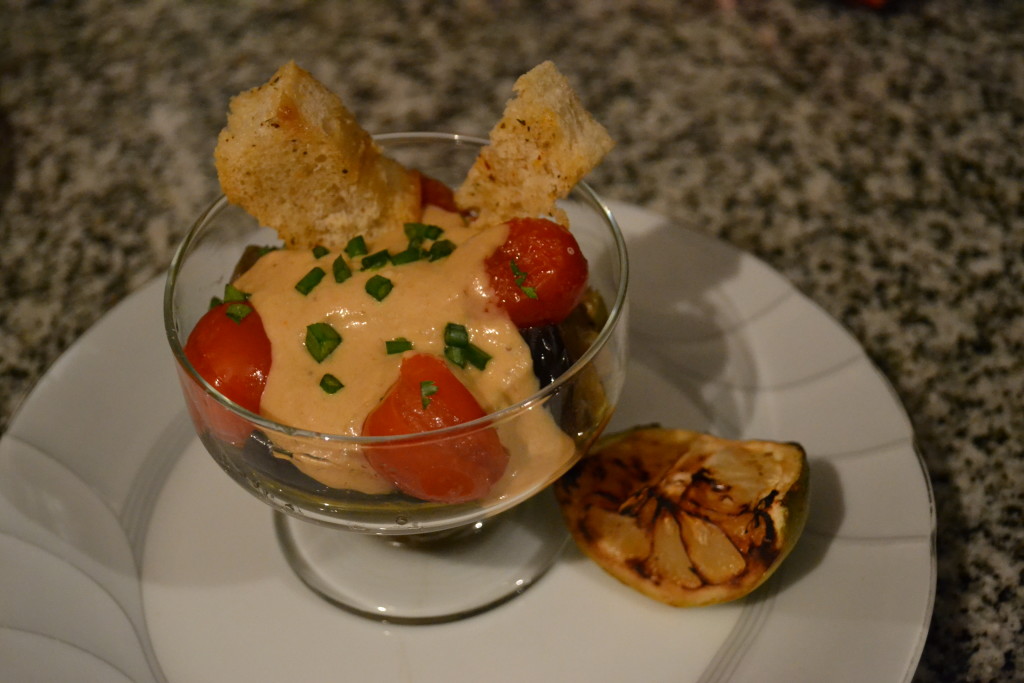On Sunday supplement
Food and Wine
Around the world, anywhere there are Italians, you’re likely to find Vitello tonnato, that classic dish of slices of cold poached veal topped with a creamy tuna sauce. It’s one of those dishes that seems like it must go back in history to some far distant, early epoch. Different regions of Italy claim it as their own. Italian cooking authority (in English), Ada Boni, asserts it as a Lombardian dish but doesn’t delve into it. As best anyone seems to have researched it, the dish goes back to the late 19th century and although it likely graced the tables of fine restaurants in Milan, it also graced those of other regions.
Beyond the combination of veal (and traditionally, we’re talking unweaned calf, milk fed veal, not naturally raised veal) and tuna, all is fair game in both presentation and condiments. Oh, there are traditions, but they are often bent, stretched or ignored – egg yolk, capers or caper berries, lemons, chilies, and more come into play. Some insist the veal be roasted, others braised. Some cook the veal with all its condiments and then turn the juices into the sauce, others keep them separate. Some assert that the sauce be ladled over the veal well in advance to mingle the flavours, others prefer to keep them separate, even to serving them side by side.
Here in Argentina the dish is known as Vitel thoné, (also “toné or tonné”) I’ve found no history as to why it’s called this. Neither word is Spanish, neither word is Italian (where tonno would be the spelling, or tonni in plural). If anything it vaguely stretches to Latin, where “vitel” is the diminutive form the word for “yolk” and is sometimes used to refer to a very young calf; and thoné and its variations, well, your guess is as good as mine. In various languages it could refer to a unit of weight or a clap of thunder.
Having just toddled our way through the holidays, many of us have eaten our fill, not just of this particular dish, but of more meat than we probably should have, despite the carnivorous traditions of this country’s cuisine. One of the nice things about the development of cuisine is that over time, classic sauces, like a tonnato sauce, come to be used for other dishes. And, today, I’ll hit you up with a cold salad that makes a great starter to a light dinner.
If you really want to do this up right, make your own mayonnaise with olive oil, or to go more traditional, blend all the sauce ingredients together with a yolk and then slowly whisk in olive oil until you get the texture you want. It’s summertime, we want quick and easy. Use some olive oil mayo – there are some perfectly good commercial brands available.
Eggplant “Tonnato”
1 large eggplant
16 cherry tomatoes
small baguette, 1-2 days old is best
olive oil
1 170gm can tuna, drained (roughly 120 gm tuna)
100 ml olive oil mayonnaise
1 teaspoon capers, rinsed
2 anchovies
1-2 teaspoons of chili sauce (a sambal or sriracha would be best)
1 green lemon, cut in quarters
chives, chopped
parsley, chopped
salt and pepper
Slice the eggplant into 1 cm thick slices, salt and leave to drain in a colander for 30 minutes. Rinse, pat dry. In a skillet over high heat brown the lemon quarters on both exposed sides. Set aside. Add olive oil to the pan and brown the eggplant slices until cooked through.
Meanwhile, place the cherry tomatoes with a little olive oil and salt in the oven and cook until they just start to burst (you can also do this on the stovetop).
Cut the crust off the baguette and cut the bread in cubes, drizzle with olive oil, sprinkle with salt, and bake in the oven until crisp and golden brown. Let all the ingredients cool to room temperature.
Put the tuna, mayo, capers, anchovies, chili sauce into a blender and blend until smooth. Season to taste with salt and pepper. Chill in the refrigerator for about an hour to let the flavors meld.
Toss the eggplant with the chopped parsley and divide up between four serving bowls. Distribute the cherry tomatoes around to look pretty. Spoon the sauce over the top, sprinkle with chives, add in a couple of croutons for some crunch, garnish with the charred lemon wedge. Dig in!
A series of recipes and articles that I started writing for the Buenos Aires Herald Sunday supplement, Food & Wine section, at the beginning of 2012. My original proposal to them was to take local favorite dishes and classics and lighten them up for modern day sensibilities. We’re not talking spa or diet recipes, but at the very least, making them healthier in content, particularly salt, fat and portion size. As time went by, that morphed into a recipe column that, while emphasizing food that is relatively “good for you”, wasn’t necessarily focused on local cuisine. At the beginning of 2013 I decided to stop writing for them over some administrative issues, but it was fun while it lasted.
